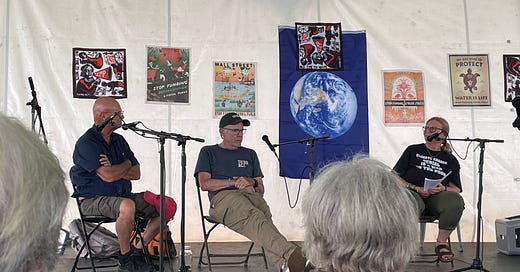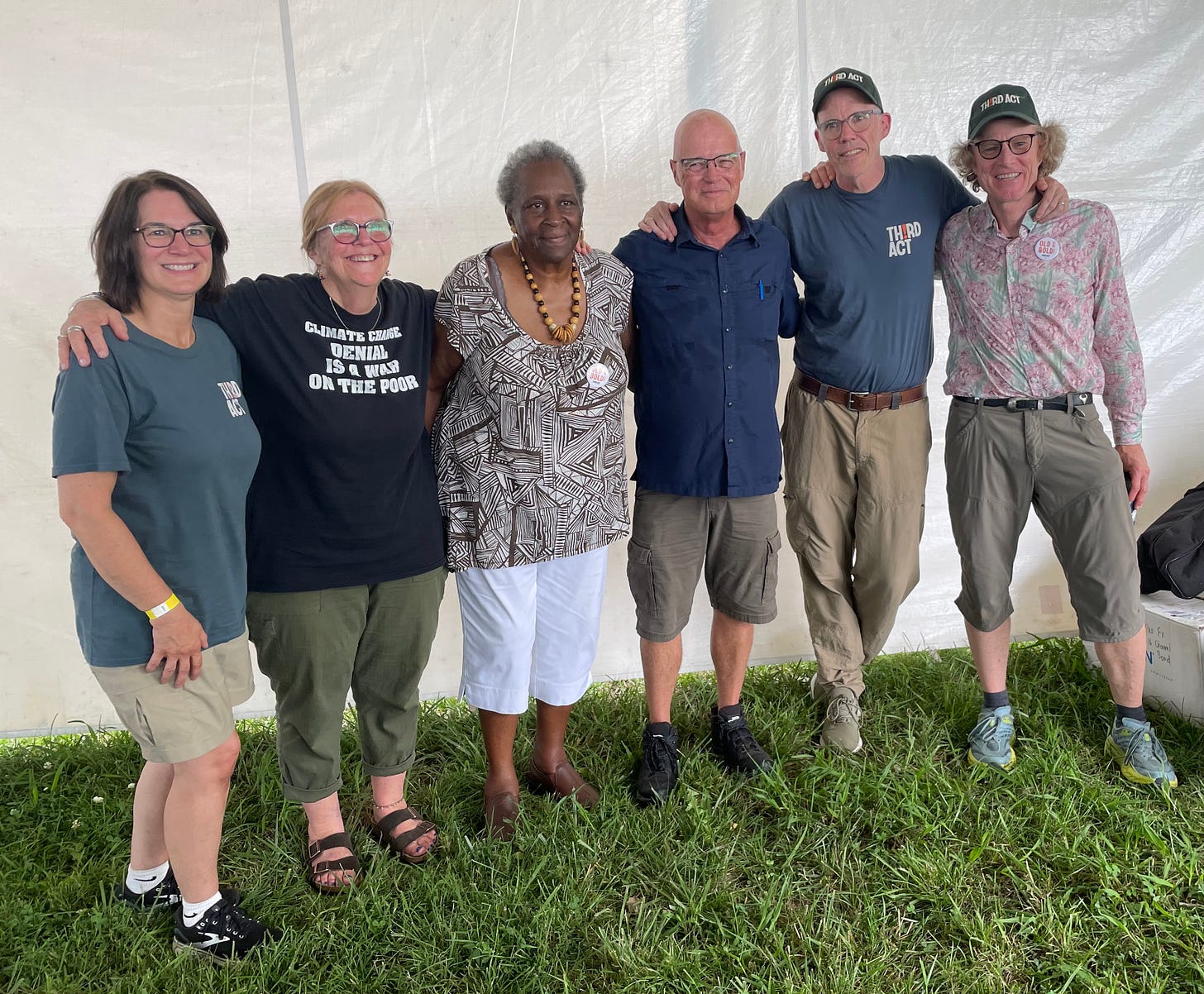Refugia News and More
Hello, friends. Today we’re going to hold off on our usual climate news dump/commentary because I’m here at the Wild Goose Festival in Union Grove, North Carolina. Wild Goose is hard to describe: progressive Christians at summer camp? Kind of. It’s people from all over, mostly progressive Christians but also people on various margins-of-faith, all looking for a space to connect and explore what faith means outside the strictures of whatever faith communities are creating strictures for them. There are tents and food trucks and many, many sessions. It’s good fun.
I’m here under the auspices of Third Act Faith, a subgroup of Third Act. This is the activist group founded by Bill McKibben and others as a way to get people over 60—in their “third act” of life—involved in protecting climate and democracy. (I would like to point out that I am not yet 60. I’m just getting started early.) Third Act is only two years old, and people are flocking to it. Some 60,000 members so far? (I’ll have to double check that.)
Somehow I ended up on the speaking roster for Thursday’s all-day “Climate Justice Camp”—seriously, it happened kind of last minute. And I’m so glad. It was an incredible privilege to be a part of this. I mean, look at the speakers I was on stage with!!
Here are a couple photos from Climate Justice Camp. On the right is Melanie Griffin, an on-staff organizer from Third Act Central who designed the day’s activity. On the left is Brian McLaren, with Bill McKibben in the middle.
The speakers for the day included (left to right) me, Melanie, the wonderful North Carolina climate justice organizer Belinda Joyner, Brian, Bill, and B Fulkerson—also on staff at Third Act Central.
I wrote down just a few juicy quotes and highlights for you, not only from yesterday’s events but from other sessions today as well.
From Belinda Joyner:
“‘Can’t’ is not a word we use.” This her way of describing how to get people involved even if they’re reluctant. Never mind what people say they can’t do. Ask them what they can do. Give them options.
“I don’t drink Kool-aid.” Belinda said she’d rather not be in any sort of public office. She’d rather be on the “other side of the table” so she can speak the truth without having to be careful which constituent she’s offending. People have different roles and that’s good. This the one she chooses.
From Brian McLaren:
Brian is completing a new book for release in 2024. He’s become a serious climate activist and the book will be called something like Like After Doom. I know: yikes! He wants to look the direst possible outcomes right in the eye and still come out of it full of determination. The audience really appreciated many things he said, including some good advice about activism: “Don’t fight your allies.” In other words, everyone doesn’t have to be contributing in the same way. Stick together and affirm each other. The audience also appreciated his words about leading with the vision of the future you are committed to, and not worrying too much about convincing the people who are lagging way behind.
Is it too late? A lot of people wanted to know. Brian is clear that we have to be truthful about this: For a lot of things, yes, it’s too late. For many species, ecosystems, places to live—yes. However, we have to set aside the win/lose language: Can we “win” on climate change? Not a relevant question. The real question now is: How much more are we willing to lose?
Brian has done a lot of thinking about “complicated hope.” He quotes Vaclav Havel: “Some things are worth doing no matter how they turn out.” Telling people that “oh yes of course, there’s hope!” is dangerous because it makes it so easy for people to feel good and say, “I can now return to my previously scheduled complacency!”
From Bill McKibben:
Bill came to “the Goose” even though his home state of Vermont is suffering, at this minute, from extreme flooding—another symptom of our planet’s terrible fever. He said he felt guilty for being here when he should be helping to dig his neighbors out of the mud, but they give him their blessing to do the work he does. He’ll be back there soon enough.
Meanwhile, of course, in these last couple weeks, we have reached on this planet some terrifying tipping points. These have been the hottest weeks in the history of humankind. Seriously. Hottest in the last 125,000 years, we’re quite confident. Perhaps longer. And, as Bill reminded us, we are in an El Nino cycle, which makes even more heat. The next 18 months will be rough. We will almost certainly reach, temporarily, that 1.5°C threshold we’ve been trying to avoid. (Forgive me for not linking to news stories on all those stats. I’m sure you’ve seen them. Also, it’s late Friday night and I’m tired!)
I’m grateful for Bill in about a hundred ways, but I’m especially grateful for his indefatigable way of seeing everything dire as an opportunity. With a summer this rough, he says, more people will wake up, and we have to be ready to put them to work. “There is no shortcut to changing the world.” It’s work, it’s a slog, but so many amazing, creative people are joining the fight. The only “antibodies” for the planet’s fever are people. We can’t fall into cynicism, which in many ways is the opposite of hope. I’m also grateful that Bill continues to insist that churches and Christians have a key role to play. We won’t be leaders—too late for that—but our contribution is important.
OK, one more thing and then I’ll call it a night. Today, I got to record a podcast episode with Derrick Weston, host of Creation Justice Ministries’ Food and Faith Podcast (Derrick is on the right). The other guests are Katy Steinberg and Joshua Adam Scott, both very cool pastors—and authors—whose congregations are incredibly lucky to have them. We recorded an episode for Food and Faith’s “green lectionary” series, in which guests look together at a lectionary passage and explore how to read it and preach on it from a “green” perspective. We did Exodus 3 (the burning bush story), and boy, did we have fun. I can’t wait to share the episode with you. I’ll let you know when it’s released.
Bill McKibben is right: there are so many wonderful, amazing, creative, determined, joyful, faithful, smart people involved in the work of mitigating the climate crisis, building resilience, inspiring others. I’m reminded again and again that even if we are facing so many grim and scary realities, there is joy in the work and in the community.
I ended one of my talks by saying that we have four choices for how we face the climate crisis. Choices 1-3 are 1) “They’ll think of something.” 2) “God will fix it.” 3) “We’re doomed.” All three are infantile responses, or at least excuses to avoid responsibility. Even so, I find myself in all those places on some days. But I try to choose a fourth choice: “I have called you friends.” This is what Jesus says to his disciples at the Last Supper, before he suffers (John 15:15). God calls us into a circle of friends in the resurrection community. Jesus invites us into friendship with God, into agency and responsibility, even when fear and trouble loom. The Celtic symbol for the Holy Spirit is the wild goose (hence the name of the festival)—that aspect of the Holy spirit that disturbs and moves to change. And it is only through the power of that Wild Goose that we can live into our calling to be friends with God.






